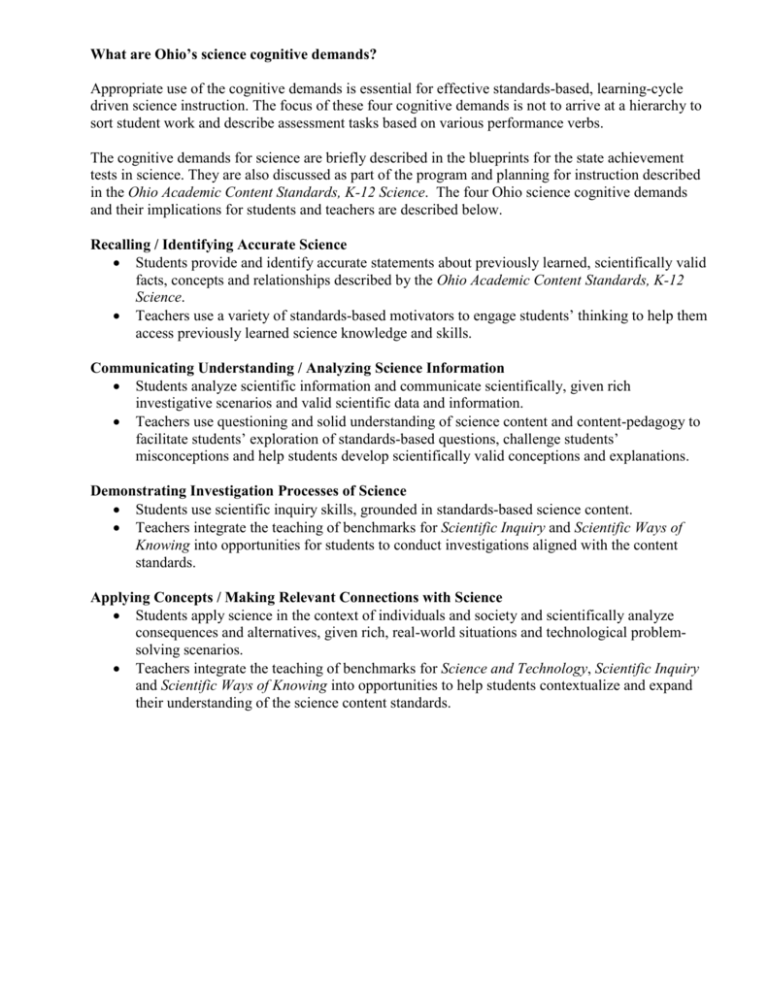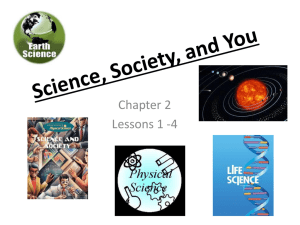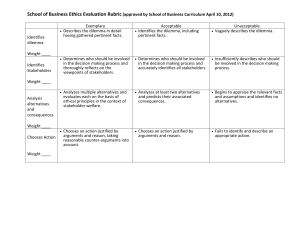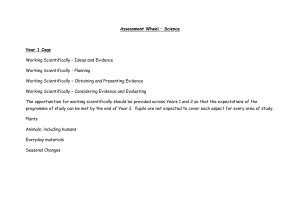What are Ohio`s science cognitive demands
advertisement

What are Ohio’s science cognitive demands? Appropriate use of the cognitive demands is essential for effective standards-based, learning-cycle driven science instruction. The focus of these four cognitive demands is not to arrive at a hierarchy to sort student work and describe assessment tasks based on various performance verbs. The cognitive demands for science are briefly described in the blueprints for the state achievement tests in science. They are also discussed as part of the program and planning for instruction described in the Ohio Academic Content Standards, K-12 Science. The four Ohio science cognitive demands and their implications for students and teachers are described below. Recalling / Identifying Accurate Science Students provide and identify accurate statements about previously learned, scientifically valid facts, concepts and relationships described by the Ohio Academic Content Standards, K-12 Science. Teachers use a variety of standards-based motivators to engage students’ thinking to help them access previously learned science knowledge and skills. Communicating Understanding / Analyzing Science Information Students analyze scientific information and communicate scientifically, given rich investigative scenarios and valid scientific data and information. Teachers use questioning and solid understanding of science content and content-pedagogy to facilitate students’ exploration of standards-based questions, challenge students’ misconceptions and help students develop scientifically valid conceptions and explanations. Demonstrating Investigation Processes of Science Students use scientific inquiry skills, grounded in standards-based science content. Teachers integrate the teaching of benchmarks for Scientific Inquiry and Scientific Ways of Knowing into opportunities for students to conduct investigations aligned with the content standards. Applying Concepts / Making Relevant Connections with Science Students apply science in the context of individuals and society and scientifically analyze consequences and alternatives, given rich, real-world situations and technological problemsolving scenarios. Teachers integrate the teaching of benchmarks for Science and Technology, Scientific Inquiry and Scientific Ways of Knowing into opportunities to help students contextualize and expand their understanding of the science content standards. Guide to Using Cognitive Demand to Reflect on Teaching and Learning Task Criteria Recalling/Identifying Accurate Science Does the task require students to recall, identify or recognize accurate scientific information; AND define, describe, relate, represent, classify or verify that scientific information? Communicating Understanding / Analyzing Science Information Does the task require students to use scientific information from investigative scenarios, including experimental data or valid and accurate scientific data; AND represent or model; explain, extract or analyze; interpret data and draw conclusions; generalize, evaluate, justify, compare, contrast or classify to answer scientific questions? Demonstrating Investigation Processes of Science Student Performance Accurately recalls, identifies Correctly describes, verifies Recognizes and/or classifies scientific information and/or relationships Demonstrates depth of knowledge Demonstrates ability to use prior science knowledge Differentiates fact from fiction Reflection on Learning How does the student demonstrate that he/she knows science? Accurately interprets information provided Correctly identifies, describes, classifies, compares/contrasts to demonstrate understanding of science concepts Diagrams or models to communicate understanding of concepts Identifies, extracts, interprets, justifies, concludes, infers, detects patterns, demonstrates deductive and inductive reasoning Correctly applies appropriate mathematical reasoning to explain science concepts Distinguishes observation from inference Formulates and/or identifies clear, researchable scientific questions Uses appropriate tools to address or resolve questions with methods that generate valid data; specifies variables and controls Proposes future procedures that are linked to previous steps Makes logical predictions linked to investigative procedures and available data How does the student analyze and communicate his/her thinking about scientific information? Does the task require students to demonstrate knowledge of how a scientific task is performed in an experimental or investigative scenario; AND collect relevant data, reason logically, devise hypotheses, make predictions, design and/or systematically evaluate experiments and/or identify appropriate use of tools? Applying Concepts / Making Relevant Identifies and describes relevant applications Connections with Science to personal/societal issues using sciencebased evidence Does the task require students to think Identifies and discusses consequences and scientifically in the context of the alternatives individual and society; Provides solutions that contain accurately AND identified and discussed science connections apply information, illustrate with relevant to appropriate scientific and examples, find solutions, analyze and technological principles interpret problems, consider Distinguishes inference from opinion consequences and alternatives, and/or integrate and synthesize scientific information? o Accurate facts o Science concepts o Relationships o Organization o Analyses, conclusions and evidence o Trends and patterns How does the student show that he/she can plan and conduct meaningful scientific investigations? o o o o Scientific questions Methods and tools Future steps Predictions How does the student demonstrate an understanding of science applications and how science connects to individuals and society? o Solutions o Consequences o Alternatives





